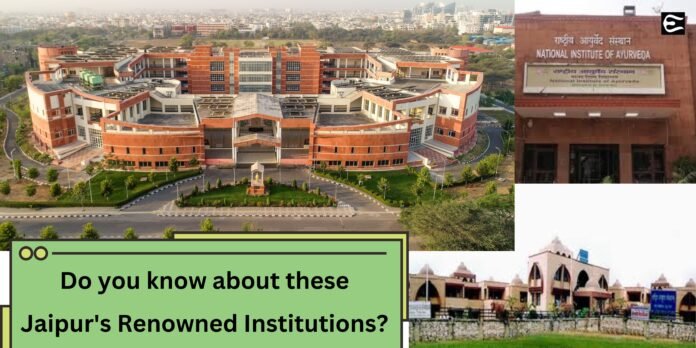
Jaipur, the capital of Rajasthan, has already made a mark across the globe as a tourist hub with its palatial palaces, rich heritage and beautiful culture.
However, not many are aware that this pristine city is also leading from the front in technology, ayurveda and in promoting Sanskrit too.
Since ages, Jaipur has been hub of technology, ayurveda and sanskrit education however it’ branding as a tourist destination has fizzled out its other strengths.
Even today, the city is a hub of education and health institutions. Among these, three premier institutions stand out: Malaviya National Institute of Technology (MNIT), the National Institute of Ayurveda (NIA), and the National Institute of Sanskrit (NIS). These institutions serve diverse areas of technology, health, and traditional literature, respectively, each with its own legacy and contribution to India’s intellectual and health landscape.
Malaviya National Institute of Technology (MNIT)
Founded in 1963 as Malaviya Regional Engineering College, MNIT Jaipur gained its current name in 2002 when it became a National Institute of Technology. Named after the visionary educationist and freedom fighter Madan Mohan Malaviya, MNIT has become one of the most prestigious engineering institutes in India, offering programs in engineering, architecture, and science at undergraduate, postgraduate, and doctoral levels. It is known for its robust curriculum, skilled faculty, and research-driven approach, which have earned it a place among India’s top technical institutions.
MNIT has hosted several national and international conferences, attracting notable speakers and scholars. The institution has been visited by prominent figures from the tech industry, government, and academia, including former President Dr. A.P.J. Abdul Kalam and several renowned scientists. These visits emphasize MNIT’s role in advancing research and development, helping India stay at the forefront of innovation.
National Institute of Ayurveda (NIA)
Established in 1976 by the Ministry of Health and Family Welfare, the National Institute of Ayurveda (NIA) in Jaipur is one of India’s premier institutes dedicated to the study, research, and practice of Ayurveda. NIA is unique in its mission to blend traditional Ayurvedic practices with modern healthcare. With a daily inflow of approximately 2,000 patients, the institute is often referred to as a “magic center” for its ability to treat a wide range of ailments using natural remedies and therapies.
NIA has seen visits from eminent personalities and dignitaries, including health ministers, prominent Ayurvedic practitioners, and even international figures interested in traditional medicine. Many visitors are drawn by the institute’s renowned Panchakarma therapy, which includes purification processes aimed at holistic healing and wellness. NIA also offers extensive educational programs, training Ayurvedic doctors and practitioners who continue to propagate the ancient Indian medical science both nationally and globally.
Recently, the National Institute of Ayurveda (NIA), has proudly secured the first rank across the country and achieved an A Grade rating from the National Commission for Indian System of Medicine (NCISM)!26
National Institute of Sanskrit (NIS)
The National Institute of Sanskrit (NIS), also known as Shri Lal Bahadur Shastri Rashtriya Sanskrit Vidyapeetha, was founded to promote the study and preservation of Sanskrit language and literature. NIS plays a crucial role in maintaining India’s linguistic heritage and provides courses in Sanskrit grammar, literature, Vedic studies, and philosophy.
As a center of traditional literature, NIS attracts scholars, students, and dignitaries dedicated to preserving and revitalizing the Sanskrit language. Distinguished guests have included scholars, linguists, and government officials who value Sanskrit’s cultural and spiritual significance. The institution is instrumental in keeping India’s literary heritage alive and relevant to modern times, and it has been a platform for renowned Sanskrit scholars to share insights and conduct research that links ancient texts to contemporary issues.
Swami Vivekananda visited Jaipur in 1891 during his early years of spiritual wandering (parivrajaka years). He was on a quest for knowledge, seeking to understand the depths of Indian philosophy and spirituality. During his time in Jaipur, he was particularly interested in studying Sanskrit and delving into classical Indian scriptures, including the Vedas, Upanishads, and other Sanskrit texts. Jaipur, known for its royal patronage of arts and learning, provided him access to several Sanskrit scholars and resources, which enriched his knowledge and understanding of Hindu philosophy.
Vivekananda’s visit to Jaipur was part of his broader journey to explore and absorb India’s ancient wisdom. The city’s libraries and its learned Sanskrit scholars helped him refine his understanding of spiritual texts, which later shaped his powerful oratory and philosophy. This study of Sanskrit texts also played a crucial role in preparing him for his eventual mission of bringing Indian spirituality to the world stage, most notably during his famous address at the Parliament of the World’s Religions in Chicago in 1893.
Contributions to Jaipur’s Legacy
Together, MNIT, NIA, and NIS enrich Jaipur’s legacy as a city of knowledge, health, and tradition. MNIT is a beacon for engineering and technological advancement, producing professionals who contribute to India’s growth in science and innovation. NIA promotes Ayurveda as a viable and holistic healthcare option, offering alternative treatments that attract thousands daily. NIS, meanwhile, preserves and promotes the Sanskrit language, ensuring that traditional knowledge systems remain accessible and valued in modern India. These institutions are indeed Jaipur’s pride, shaping lives and contributing to a knowledge-rich India.

